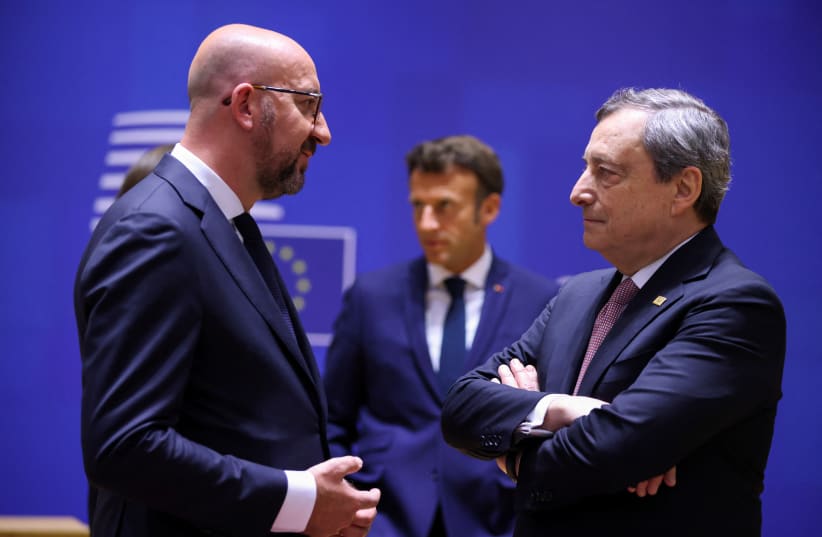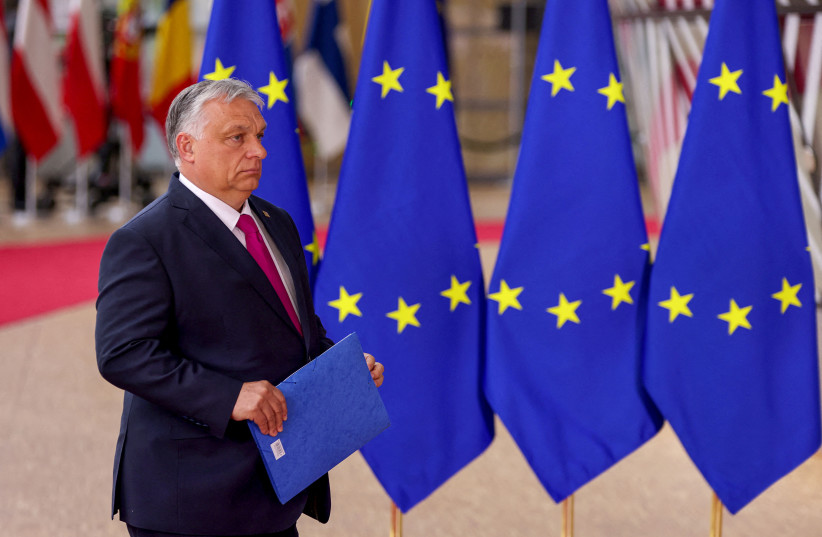European Union leaders have agreed an embargo on Russian oil imports that will start kicking in towards the end of the year and which exempts, for now, pipeline imports that Hungary and two other landlocked Central European states rely on.
The toughest sanction yet on Russia for its invasion of Ukraine, agreed overnight after weeks of wrangling, aims to remove 90% of Russia's crude imports into the 27-nation bloc by year-end, senior officials said.
"The purpose is to stop Russia's aggressive war"
Latvian Prime Minister Krisjanis Karins
Two-thirds of the Russian oil imported by the EU comes via tanker and one third through the Druzhba pipeline.
The ban on the seaborne imports will be imposed with a phase-in period of six months for crude oil and eight months for refined products, a European Commission spokesperson said.
This means the target for refined products is effectively early 2023 rather than at the end of this year, since that timeline would kick in once the sanctions are formally adopted, with EU states aiming to do this week.
The target to cut 90% of all Russian imports by the end of 2022 includes seaborne deliveries as well as Poland and Germany stopping their own imports of Russian oil via pipeline by then, which they have pledged to do.
The remaining 10% would be temporarily exempt from the embargo so that landlocked Hungary, Slovakia and the Czech Republic have access to Russian oil from the Druzhba pipeline.
Oil prices extended a bull run after the EU's agreement, stoking concern about inflation, which was run at a record high of 8.1 percent year-on-year in eurozone countries this month, Eurostat said on Tuesday.
Russian gas next target?
The oil embargo deal follows an earlier ban on Russian coal and allows the bloc to impose a sixth round of sanctions that includes cutting Russia's biggest bank, Sberbank SBMX.MM, from the SWIFT international system.
But while several countries already want work to begin on the seventh round of sanctions, Austrian Chancellor Karl Nehammer said: "Gas can't be part of next sanctions."
Europe is heavily dependent on Russian gas, which explains why it has been left out of EU sanctions so far. The EU this month agreed a law requiring countries to fill gas storage to reach at least 80% ahead of next winter, in a bid to create a buffer against supply disruptions.
EU gas storage is currently 46% full.
"Russian oil is much easier to compensate...gas is completely different, which is why a gas embargo will not be an issue in the next sanctions package," Nehammer said.
Canada imposes Russia-related sanctions
Canada said Tuesday it was imposing new sanctions on Russia and putting restrictions on 22 individuals and four entities in response to Moscow's invasion of Ukraine.
The new sanctions will affect individuals and entities listed are senior officials of Russian financial institutions and their family members, as well as key financial institutions and banks,
Since Russia’s invasion of Ukraine on February 24, 2022, Canada has imposed sanctions on more than 1,050 individuals and entities from and in Russia, Ukraine and Belarus.
“For every action taken by President Putin to undermine Ukraine’s territorial integrity, Canada will not hesitate to take appropriate countermeasures. Canada will relentlessly pursue accountability for the Russian regime’s unjustifiable acts. We stand with Ukraine and its people.”
Mélanie Joly, Canadian Minister of Foreign Affairs
Further sanctions on Russia?
French President Emmanuel Macron said on Tuesday that, following a sixth European Union package of sanctions against Russia, nothing could be ruled out in terms of additional sanctions in the coming weeks.
Speaking to reporters following an EU summit in Brussels, he also said he hoped that in the next days and weeks agreement could be reached with Russia to allow more exports of food from Ukraine.
He said recent talks on the matter between the Russian and Turkish presidents had produced "positive conclusions."
"I hope that the next few days or weeks will make it possible to resolve this situation," Macron added.
How does Zelensky feel about new sanctions?
Ukrainian President Volodymyr Zelensky on Tuesday welcomed the sixth package of European Union sanctions against Russia but criticized what he called an "unacceptable" delay in the bloc agreeing with the latest measures.
"When over 50 days have passed between the 5th and 6th sanction packages, the situation is not acceptable for us," Zelensky said, speaking alongside Slovakia's President Zuzana Caputova in Kyiv.

